Three more blogs have been blocked in Tunisia this week. These blogs, Mochagheb (Disturber) and Ennaqed (The Critic) and Place Mohamed Ali have all been particularly active in providing news of the struggle of The Tunisian General Labour Union (UGTT), and especially about the latest social unrest in the southwestern phosphate mining region of Gafsa, where two people have been killed. One was shot dead by security forces and the other was electrocuted inside a local electric generator.
I asked the Tunisian blogger Ennaqed about the censorship of his blog in Tunisia. He said:
I think that the main reason of banning my blog is crossing the “red lines” that are constraining the media in Tunisia by talking about issues that are completely ignored by mainstream media. Last year, I was seriously engaged in covering the hunger strike of three Tunisian secondary school teachers who were expelled from their jobs for political reasons, and my blog was blocked temporarily. And like the rest of the Tunisian bloggers, I was blogging about the revolt in the mining region and recently about the prisoner swap between Israel and Hezbullah, and the remains of eight Tunisian men handed over by Israel. But, honestly, I think that the most direct reason for banning my blog might be my last blog post about the participation of an Israeli delegation in the 31st Congress of the International Geography Union (IGU) that is taking place in Tunisia. What I actually did is copy and re-post a press release about a group of Palestinian geographers who are boycotting the aforementioned conference because of Israeli participation.
On June 21 the censorship passed beyond all reason and banned the first and only podcasting Tunisian blog Radyoun (Radio) run by a group of Tunisian bloggers dedicated to discussing social and cultural topics. Apparently, the podcast debate about the sporadic protests in the poor mining region of Gasfa and about the freedom of expression led to the banning of the blog.
This is a non-comprehensive list of blocked blogs in Tunisia. Please keep in mind that the list does not include blocked websites:
- Citizen Zouari, blog of Tunisian journalist and former political prisoner, Abdallah Zouari.
- The Free Pen the blog of Tunisian journalist and former political prisoner, Slim Boukhdhir. In July 2007, this blog was also hacked and deleted.
- Mokhtar Yahyaoui, blog of a former Tunisian judge who was dismissed after publishing an open letter to President Ben Ali criticising the lack of independence of the judiciary.
- Tunisia Watch, this blog is also run by Mokhtar Yahyaoui.
- Astrubal
- [fikra] blog of Tunisian activist and political refugee Sami Ben Gharbia.
- Nawaat, popular group blog about news, politics, cyber-activism and Islamic reform.
- Radyoun, the podcasting Tunisian blog.
- Moaz Jmai. (this blog has been blocked in Tunisia where I’m writing this post)
- Place Mohamed Ali (this blog has been blocked in Tunisia where I’m writing this post)
- Sofiane Chourabi.
- Nader.
- Free Race.
- Samsoum .
- Tunisian Citizen.
- For Gafsa.
- Mochagheb.
- Annaqued.
- Zabbaleh.
- Adam.
- Moumni.
- Free Word.
Attacks on video-sharing websites
Despite the fact that Tunisian authorities have permanently blocked access to both popular video-sharing websites Dailymotion and YouTube, on 3 September, 2007 and 2 November, 2007 respectively, Tunisian netizens have still managed to access these websites to either watch or share videos. And while the Tunisian government worked hard to ensure that the polished image of a “secular, modern and democratic” state would not be marred by any “negative” information disseminated by opponents on the web, Tunisian video activists and bloggers kept the spotlight on the Redeyef revolt exposing harsh repression and flooding both banned video-sharing websites Youtube and Dailymotion with footage of demonstrators, protesting against unemployment and nepotism, clashing with the police. And when the official media remained silent about the death of two demonstrators, videos of the victims, the wounded and the use of firearms against civilians, were smuggled out of Tunisia and posted on the video-sharing websites.
The anti-censorship campaigns
Interest in online censorship in Tunisia has never been higher since the World Summit on the Information Society (WSIS) in Tunis in November 2005 when a hardcore group of Tunisian bloggers and activists supported by sympathizers, organized a successful online campaign around Yezzi Fock Ben Ali (Enough is enough, Ben Ali) a “Freedom of Expression in Mourning!” campaign, the entire field of the online battle for freedom of speech has changed. The transformation owes to the growing number of bloggers, video and Facebook activists who are walking down the path of digital activism that was gradually and patiently traced by the first pioneers of the Tunisian online free speech movement who brilliantly used web 2.0 tools (videos, mash-ups, photos, etc.) to protest the crackdown on online free speech.
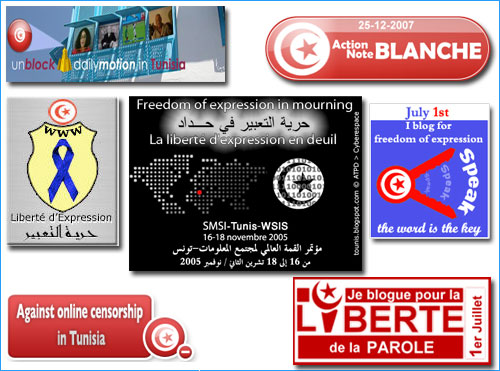
Badges of Tunisian online anticensorship campaigns
There is a growing number of blog posts and comments talking and/or protesting censorship. According to the advanced search engine of the recently launched North African Blogs aggregator, Berberus (Beta), of the 274 blog posts containing the word “censure” (censorship), 165 are Tunisian.
And of the 256 comments containing the same word, 98 were left on Tunisian blogs.
Compared with other North African Internet users, Tunisian Netizens seem to be much more interested in censorship than their counterparts in Algeria and Morocco. This trend is confirmed by the following graphs, generated by Google Insights for Search:
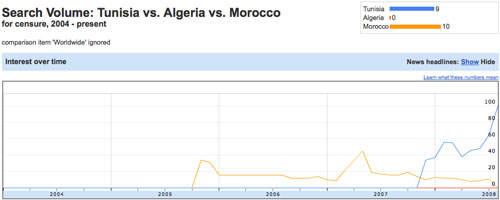
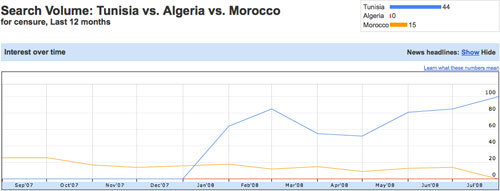
Back to April 2007. Following the ban on Dailymotion, Tunisian bloggers and activists from Nawaat.org launched the “Unblock Dailymotion campaign” in order to draw public attention to the aggressive online censorship policy adopted by the Tunisian regime. Cybversion.org blog was created to protest the ban of the Dailymotion and has since evolved into a group blog documenting censorship, anti-censorship and digital activism in Tunisia.
Fifty-one Tunisian bloggers are now running a new anti-censorship blog campaign launched on June 20 that encourages the local blogsphere to republish posts from censored blogs as part of the campaign to sensitize the public to the issue of online free speech. The blog campaign has received a lot of media attention from the Arab world and has been featured on the official website of Al Jazeera and the Qatari “Al-Arab” newspaper.
Badges and a headline widgets that use the free Feed2JS service displaying headlines of the anti-censorship blog campaign have been designed to build community around the blogs and help Tunisian bloggers stay updated about newly published content.
July 1st, is now “I blog for freedom of expression” day which Tunisian bloggers celebrate by blogging about free speech and/or by displaying a badge. Meanwhile, from time to time, Tunisian bloggers carry out ad-hoc campaigns to protest the banning of specific blogs or websites like the Blank Post Day that has been organized twice: the first time on 25 December 2006 and the second on 25 December 2007.
Tunisian netizens bid farewell to Facebook
On the social networking websites, Facebook, several groups protesting online censorship in Tunisia have been created.The most important one has so far gathered more than 620 members. Other groups have been created requesting the ATI (The Tunisian Internet Agency, which oversees Web distribution in the country) not to block Facebeook, which, unfortunately, seems to be blocked since yesterday by at least two of the country’s largest ISPs (Globalnet and PlaNet), as reported by several Tunisian bloggers and Facebook groups who were faced yesterday with the famous Tunisian 404 block page that states that the requested Web site could not be found.
It’s far more than just censorship
Blocking web 2.0 websites (Youtube, Dailymotion, Facebook) and barring access to local outspoken websites and blogs is the most obvious way of cracking down of the online free speech in Tunisia. It should be emphasized, however, that this is only one tool in the regime’s hand. Tunisia has adapted to the web 2.0 revolution by developing a broader strategy composed of a wide range of instruments including:
Punishing and persecuting outspoken online writers, bloggers and dissidents:
Between 2001 and 2008 more than 12 people have been arrested and/or sentenced because of their online activities:
- The seven cyber dissidents known as the Youth of Zarzis;
- The cyber dissident Zouhair Yahyaoui;
- The forum administrator Ramzi Bettibi, known as the Tunisian “prisoner of the Net;
- The online writer and Human rights advocate Mohamed Abbou;
- The online Journalist and blogger Slim Boukhdhir;
- The journalist and blogger Mohamed Fourati;
- And while the last prisoner of opinion, blogger and Internet journalist Slim Boukhdhir, has been released from jail on 21 July, the Tunisian human rights NGO, Freedom and Equity, reported that a 22-year old ICT Student, Mariam Zouaghi, has been arrested, on July 26th, 2008, for visiting banned websites.
Creating an atmosphere of fear:
As is the case of China, creating a strong atmosphere of fear and a climate of intimidation has led Tunisian citizen to in general adopt a low profile vis-a-vis freedom of expression. During the last 7 years, most internet users and bloggers were censoring themselves by avoiding to raise their voices to address political topics or write freely bypassing the strict state censorship. Only a handful of activists, cyber dissidents and bloggers, usually the same men, are leading the free speech movement on the Internet, going well beyond these limits and even organizing an online anti-propaganda machine to the official one.
Hacking of dissident websites and blogs:
Almost every single Tunisian opposition website and self-hosted blog has been the victim of one or more hacking incidents. While there is no solid evidence that the Tunisian regime is behind attempts to take down opponent websites, there is quite a strong feeling among Tunisian opposition figures that the government is carrying out cyber-attacks, given their frequency and the nature of the targeted websites and blogs.
Moncef Marzouki, one of Tunisia’s most prominent human rights defenders (former President of the Tunisian League for Human Rights and leader of the banned opposition party Congrès Pour la République) openly accused the Tunisian regime of orchestrating and waging these destructive attacks against the opposition Web: “In a week my website was hacked four times (…) All of this, of course, happened simultaneously with the hacking of web based email accounts that the Tunisian police is carrying out against Human rights advocates and political opponents.”

Screenshots of hacked Tunisian websites
What we have seen more recently is that the attack on collective blog Nawaat.org (deleting of the database and ftp files) happened simultaneously with the hacking of the personal blogs and email accounts of the activists running Nawaat. According to a press release issued on 16 June, 2008, Reporters Without Borders stated that:
The Tunisian news and blog wesbite Nawaat (http://www.nawaat.org/) yesterday suffered its most serious hacker attack since its creation. Its database was erased and its home page was modified (see photo). Blogs by human rights activists Sami Ben Gharbia (http://www.kitab.nl/ ) and Astrubal (http://astrubal.nawaat.org/) were also affected. Their blogs continue to be inaccessible and their databases have been badly damaged. The websites have been restored although some dysfunction continues.
This is a non comprehensive list of targeted blogs and websites:
Filtering emails:
As reported earlier by Reporters Without Borders and some Tunisian NGOs, Tunisian human rights defenders are having trouble reading their emails on the three important web based mail clients: Yahoo, Gmail and Hotmail:
Reporters Without Borders is also surprised by the problems Tunisian Internet users are having with their email. Messages sent to them by human rights organisations such as the International Association for Supporting Political Prisoners (AISPP), the Tunisnews website or Reporters Without Borders are illegible on arrival.
Several sources said the messages can be seen in the inbox and can be opened, but often there is nothing inside. Once opened, they disappear from the inbox. “It looks like badly concealed filtering,” a specialist said.
It is worth noting that the issue does not affect “fresh/new” webmail accounts and it only happens when you log in to these accounts from within Tunisia. I have personally run a test, from The Netherlands with Tunisian lawyer Abdel Wahab Maatar and Tunisian blogger, activist, and former political prisoner Abdallah Zouari. I logged into their email accounts and was able to read their emails normally. The content I saw displayed was not the same they were reading. Here are two screenshots of the test. The first is from The Netherlands where I’m base and the second from Tunisia:
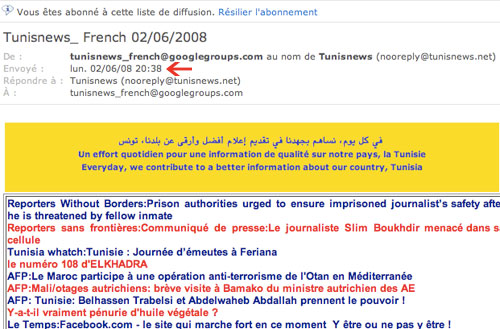
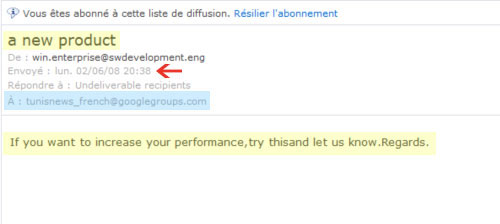
So it seems the email accounts of some Tunisian Internet users are being monitored by Deep Packet Inspection (DPI) without their knowledge. DPI is a technology that has the ability to monitor the online activity and filter the traffic on the network by removing “unwanted” material from the actual body of received emails.
Recently, I asked Robert Guerra - a Toronto-base technologist who helps NGOs with data privacy, secure communications and information security about this. These are his comments:
At first glance, seems that there’s some realtime interception of webmail and possibly other traffic is taking place. In a way, it looks like there’s a network neutrality issue… Perhaps Deep Packet Inspection (DPI) is being used. If indeed DPI is taking place, it might be worthwhile to raise it on the numerous DPI discussions that are taking place. The discussion in Canada is quite active, one where activists could use the Tunisian example to help their case. (…) it might be that existing accounts have been compromised in some way. Should ask if the accounts that are being affected were accessed at public (ie. net cafe) pc’s . if so, passwords might have been captured.

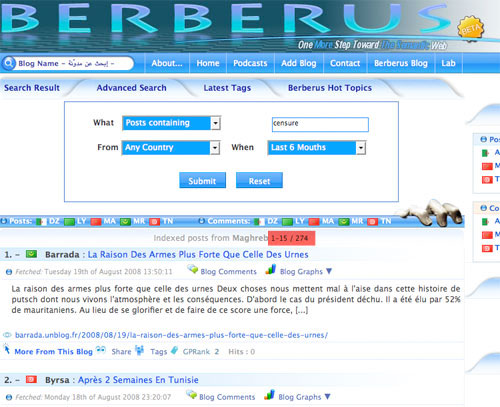
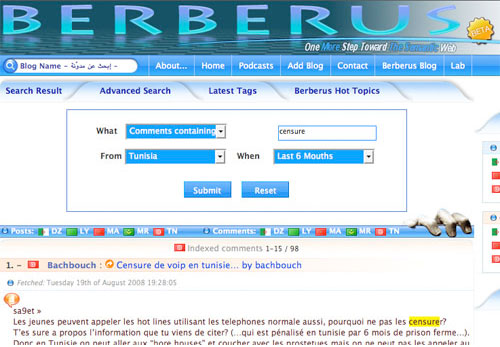












هناك تعليق واحد:
Good good good......
إرسال تعليق